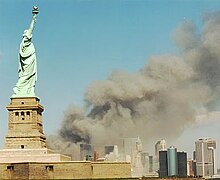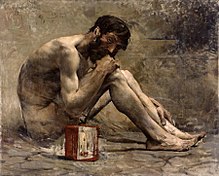Nihilism

Theybelieveinnothing.~Dude De Ching
Nihilism(pronounced: /ˈnaɪ.ɨlɪzəm/ or /ˈniː.ɨlɪzəm/; from the Latinnihil,nothing) refers to sets ofbeliefswhichnegateone or more apparentlymeaningfulaspects ofReality.Some are forms ofexistential nihilism,which argue thatlifeis without objectivemeaning,purpose,orintrinsic value.Moral nihilistsassert thatmoralitydoes not inherently exist, and that any established moral values are abstractly contrived. More extreme forms can insist thatknowledgeis not possible, and thattruth,beautyor reality do not actually exist. The term nihilism often relates toanomiein indicating general moods ofdespairat a perceived pointlessness of existence which can develop with beliefs that there are nonecessarynorms,rules,orlaws.
Quotes
[edit]



- What is mostneededtoday is a fundamental theological thinking, one centered upon theGodheaditself, and centered upon that which is most challenging or most offensive in the Godhead, one which has truly been veiled in the modernworld,except by our mostrevolutionarythinkersandvisionaries.If we allowBlakeandNietzscheto be paradigmatic of those revolutionaries, nowhere else does such a centering upon God or the Godhead occur, although a full parallel to this occurs inSpinozaandHegel;but the language of Hegel and Spinoza is not actually offensive, or not in its immediate impact, whereas the language of Nietzsche and Blake is the most purely offensive language which has ever been inscribed. Above all this is true of the theological language of Blake and Nietzsche, but here a theological language is a truly universal language, one occurring in every domain, and occurring as that absolute No which is the origin of every repression and everydarkness,and a darkness which is finally the darkness of God, or the darkness of that Godhead which is beyond “God.”Only Nietzsche and Blake know a wholly fallen Godhead, a Godhead which is an absolutely alienNihil,but the full reversal of that Nihil isapocalypseitself, an apocalypse which is an absolutejoy,and Blake and Nietzsche are those very writers who have most evoked that joy.
- Thomas J. J. Altizer,inGodhead and the Nothing(2003), Preface
- Theapocalypseis finished, today it is the precession of the neutral, of forms of the neutral and ofindifference.I will leave it to be considered whether there can be aromanticism,an aesthetic of the neutral therein. I don't think so — all that remains, is the fascination fordesertlikeand indifferent forms, for the very operation of thesystemthat annihilates us. Now, fascination (in contrast to seduction, which was attached toappearances,and to dialecticalreason,which was attached tomeaning) is a nihilisticpassionpar excellence,it is the passion proper to the mode ofdisappearance.We are fascinated by all forms of disappearance, of our disappearance.Melancholic and fascinated, such is our general situation in an era of involuntary transparency.
I am a nihilist.
I observe, I accept, I assume the immense process of the destruction of appearances (and of the seduction of appearances) in the service of meaning (representation, history, criticism, etc.) that is the fundamental fact of the nineteenth century.- Jean Baudrillard,inSimulacra and Simulation(1981), Ch. 18: On Nihilism, translation by Sheila Faria Glaser.
- What I do is more of a thought experiment which tries to explore an unknown field by other rules. This doesn’t mean it’s nihilistic in the sense in which nihilism means there are no longer any values, no longer any reality, but only signs: the accusation of nihilism and imposture always relates to that point. But if you takenihilism in the strong sense,the sense of a nothing-based thinking, a thinking whichmight start out from the axiom ‘why is there nothing rather than something?’– overturning the fundamental philosophical question, the question of being:‘why is there something rather than nothing?’– then I don’t mind being called a nihilist. [sic]
- Petit, Philippe (1997)Paroxysm.Interviews with Jean Baudrillard translated (1998) by Chris Turner, London: Verso. page 34
- Orthodoxy gave away the earth into the hands of the state because of its own non-belief in man andmankind,because of its nihilisticattitudetowards theworld.Orthodoxy does notbelievein thereligiousorderingofhumanlifeupon the earth, and it compensates for its own hopelesspessimismby a call for the forceful ordering of it by stateauthority.
- The newreligiousconsciousnessrises up against the nihilisticattitudetowards theworldandmankind.If a religious rebirth be possible, only then on this soil will there be the revealing of the religious meaning of secularcultureand earthly liberation, the revealing of thetruthabout mankind. For the new religious consciousness the declaration of the will ofGodis together with this a declaration of therightsofman,a revealing of theDivinewithin mankind.
- Nikolai Berdyaev,in "Nihilism On A Religious Soil" (6 May 1907)
- al-Qaedaand its allies have no clear demands for the middle east. The only common thread in their approach is a violent and destructive opposition todemocracyin any form.… al-Qaeda's methods, too, are different. It recognises no common bonds withpeoplewho have differentbeliefsand its members are prepared to kill indiscriminately.Indeed, massmurderis their explicit objective — the measure ofsuccessin their terms. Their methods of recruitment bear more comparison to self-destructive cults than political movements.However, we must acknowledge that their modern nihilism is innovative, flexible and cunning.al-Qaeda and the networks that are inspired by it approach the task with all the resources of modern technology and all the focus of modern zealotry. The most important conclusion to draw from this analysis is that there is no particular Government policy decision, or even an overall policy stance, which we could change in order somehow to remove oursocietyfrom the al-Qaeda firing line.Its nihilism means that our societies would cease to be a target only if we were to renounce all thevaluesoffreedomandlibertythat we have fought to extend over so many years.
- Charles Clarke,Home Secretary, British Government, indebate in the House of Commons (26 October 2005)
- Nihilists!Fuck me. I mean, say what you like about the tenets ofNational Socialism,Dude,at least it's anethos.
- TheCoen brothers,in lines for Walter Sobchak inThe Big Lebowski(1998)
Nihilists are notkind;
Theybelieveinnothing.
TheStrangeris not kind,
He drifts where thewindcatches him.Nihilists are like a bellows
Empty, yet full of hot air,
The more they threaten, the morecowardlythey seem;
TheStrangeralso rambles and loses his train ofthought
But tells a purty good story.- The Dude De Ching(2010)· ADudeist Holy Bookinspired by theTao Te ChingofLao TzuandThe Big LebowskiofJoel and Ethan Coen,Ch. 5: Nihilists
- Spielberghas been ridiculed for shooting his actors from below against impossibly Spielbergian skies and a denouement that lays theloveon copiously. But there’s nothing simpleminded about how he uses moviemagic,as a spell to dispel nihilism, to save us from the worst of ourselves by summoning up the best.
- The human race isn't worth fighting for, only worthkilling.Give the Earth back to the animals. They deserve it infinitely more than we do. Nothing means anything anymore.
- Eric Harris,as quoted in12 Rules for Life, an Antidote to Chaos(2018), by Jordan B. Peterson, Random House Canada, p. 147
- Quite apart from the fact that it conflicts with the demands and the content of the word of God, nihilism is a denial of the humanity and of the very identity of the human being. It should never be forgotten that the neglect of being inevitably leads to losing touch with objective truth and therefore with the very ground of human dignity.
- Pope John Paul IIinEncyclicalFides et Ratio,Ch. 90 (14 September 1998)
- What I relate is thehistoryof the next two centuries.I describe what is coming, what can no longer come differently:the advent of nihilism.This history can be related even now; fornecessityitself is at work here. Thisfuturespeaks even now in a hundredsigns,thisdestinyannounces itself everywhere; for thismusicof the future all ears are cocked even now. For some time now, our whole Europeanculturehas been moving as toward a catastrophe, with a tortured tension that is growing from decade to decade: restlessly, violently, headlong, like a river that wants to reach theend,that no longer reflects, that isafraidto reflect.
He that speaks here, conversely, has done nothing so far but reflect…the first perfect nihilist of Europe who, however, has even now lived through the whole of nihilism, to the end, leaving it behind, outside himself.
For one should make no mistake about the meaning of the title that this gospel of the future wants to bear. "The Will to Power: Attempt at a Revaluation of All Values"— in this formulation a countermovement finds expression, regarding bothprincipleand task; a movement that in some future will take the place of this perfect nihilism — but presupposes it, logically and psychologically, and certainly can come only after and out of it. Forwhy has the advent of nihilism becomenecessary?Because the values we have had hitherto thus draw their finalconsequence;because nihilism represents the ultimatelogicalconclusion of our greatvaluesand ideals — because we must experience nihilism before we can find out what value these "values" really had.— We require, sometime,new values.- Friedrich Nietzsche,inThe Will to Power,Preface (1888)
- Diogenes,in his mud-covered sandals, tramps over the carpets ofAristippus.Thecynicpullulated at every corner, and in the highest places. This cynic did nothing but saboter thecivilisationof thetime.He was the nihilist ofHellenism.He creatednothing,he made nothing.His role was to undo — or rather to attempt to undo, for he did not succeed in his purpose.The cynic, a parasite of civilisation, lives by denying it, for the very reason that he is convinced that it will not fail.What would become of the cynic among a savagepeoplewhere everyone, naturally and quite seriously, fulfils what the cynic farcically considers to be his personal role?
- José Ortega y Gasset,inThe Revolt of the Masses(1929), Ch. XI: The Self-Satisfied Age
- Anarchyhad been here all the nineteenth century, with its sinister offspringNihilism,and it is a simpletruththat thehumanmindcanfacebetter the most oppressivegovernment,the most rigid restrictions, than the awful prospect of a lawless, frontierlessworld.Freedomis adangerousintoxicant and very fewpeoplecan tolerate it in any quantity; it brings out the old raiding, oppressing, murderous instincts; the rage for revenge, forpower,the lust for bloodshed.
- Katherine Anne Porter,inThe Never-Ending Wrong(1977)
- TheUniversewill now be setright.Made over to fit my unique view of what should be.Let Nihilism reign supreme!
- Jim Starlin,in lines for the villainThanos,inThe Infinity Gauntlet(1991) Issue 2: From Bad to Worse
- I attacked those Western playwrights who use their influence and affluence to preach to theworldthe nihilisticdoctrinethatlifeis pointless and irrationally destructive, and that there isnothingwe can do about it. Until everyone is fed, clothed, housed and taught, untilhumanbeings have equal leisure to contemplate the overwhelmingfactof mortality, we should not (I argued) indulge in the luxury of "privilegeddespair."
- Kenneth Tynan,in "Conference at Edinburgh" (1963), later published inTynan Right and Left(1967), p. 146
- Satan:There is no God, no universe, no human race, no earthly life, no heaven, no hell. It is all a Dream, a grotesque and foolish dream. Nothing exists but you. And You are but a Thought — a vagrant Thought, a useless Thought, a homeless Thought, wandering forlorn among the empty eternities.
- Rubbing a seal’s stomach is the opposite of nihilism.
- Catherynne M. Valente,The Future is Blue(2016), inJonathan Strahan(ed.)Drowned Worlds(e-book edition,ISBN 978-1-84997-930-6)

